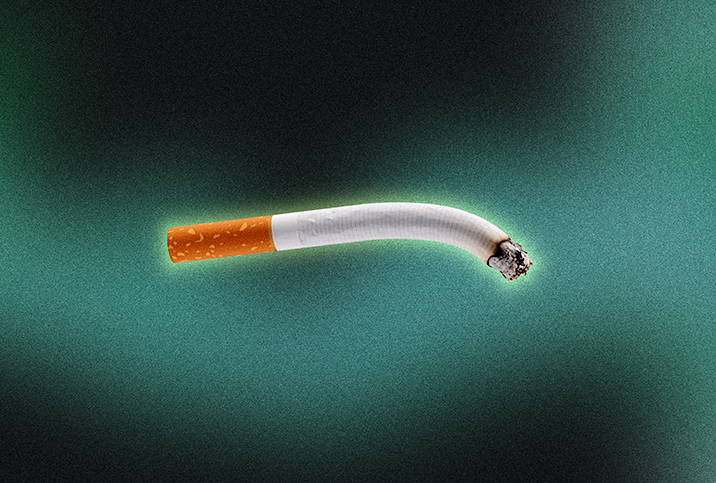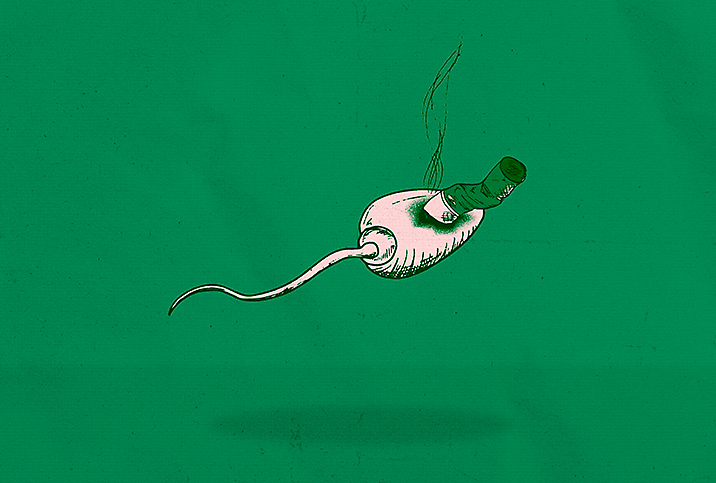Please Start Believing Smoking Harms Men's Sexual Health

Smoking has been portrayed, at times, as glamorous and cool, sexy and sophisticated. Elegant women and rugged, handsome men appeared in magazines and on billboards with cigarettes. "Smoke," they said. "It's a good thing," they implied.
Science paints a very different, not-so-sexy picture. Multiple studies across decades show smoking wreaks havoc on the skin, teeth, heart and lungs. Some of that research shows smoking affects sexual health and the reproductive system, too. Smoking and men's sexual health most definitely do not go hand in hand, with issues including erectile dysfunction (ED) and damaged sperm.
It's time for men to start believing these facts about the negative association and the consequences:
Fact #1
Smoking is a significant cause of erectile dysfunction
About 30 years ago, Laurence Levine, M.D., a professor of urology at Rush University Medical Center in Chicago, was among the first healthcare professionals to sound the alarm about smoking's impact on men's sexual function.
"To me, the number one most common single cause of erectile dysfunction is smoking," he said.
That's because cigarette smoking damages blood vessels. Most erectile issues, especially in men ages 40 and older, result from diminished blood flow to the penis.
"What I've always called the erection busters would be things which accelerate vascular aging or atherosclerotic changes in the blood vessels," Levine explained.
Atherosclerosis is a hardening and narrowing of the arteries (blood vessels) caused by plaque buildup on the inner lining. Levine and Darshan Patel, M.D., an assistant professor of urology at University of California San Diego Health in La Jolla, California, explained that smoking contributes to such plaque accumulation, inhibiting the vessels from expanding and dilating as they usually would.
In turn, Levine said, they can't fill with blood and provide the "hydraulics" necessary to produce an erection. And because the penile arteries are so small, people who smoke may experience erectile difficulties long before cardiovascular symptoms.
Other conditions known to contribute to vascular issues and ED include diabetes, high blood pressure and elevated cholesterol. The latter two are more prevalent in smokers.
Evidence also suggests that at a molecular level, smoking inhibits the nitric oxide pathway, which is crucial for blood vessel dilation, Patel wrote in an email.
Though atherosclerosis develops over time, smoking—even a single cigarette—immediately causes some degree of constriction or acute vasospasm, Levine said. In 1990, he led a groundbreaking study that demonstrated these effects, and multiple subsequent studies have supported the results.
Fact #2
Smoking can impair libido, sensation and stamina
Smoking can also impact your sexual performance because of its effects on the heart and lungs. It decreases stamina and causes shortness of breath during sex. But you might not be in the mood anyway because of its impact on hormones and the central nervous system.
Substances such as nicotine influence the central nervous system. That can impact pathways involved in sexual stimulation, including those responsible for libido and sexual arousal, according to Michael Eisenberg, M.D., a fertility scientific advisor at twoplus Fertility and the director of male reproductive medicine and surgery at Stanford University Health Care in Palo Alto, California.
Smoking can also diminish libido and sexual function by lowering testosterone levels, said Scott Miller, M.D., a urologist at Wellstar Urology in Atlanta. If that weren't bad enough, vascular damage can blunt sensitivity, Patel and Miller said, affecting arousal and pleasure, and by proxy, your sex life.
Fact #3
Sperm are negatively affected by smoking
Smoking's effect on fertility is less clear-cut than its impact on sex, Levine said. But tobacco byproducts can be found in seminal fluid, and there's ample evidence smoking can affect multiple semen characteristics, including concentration, motility (movement) and shape.
"I always encourage my patients who are smokers and are concerned about their fertility to stop smoking," Levine said.
One cohort study of 1,786 men, including 655 smokers, found smoking was associated with a 15.3 percent decrease in sperm density, a 17.5 percent decrease in sperm count and a 16.6 percent decrease in total motile sperm. Other studies have suggested that assisted reproductive technology is less effective for smokers.
"Smoke typically contains over 30 chemicals that can directly damage dividing and maturing sperm," Patel wrote.
Levine noted that research also shows washed sperm, when placed in the seminal fluid of a smoker, become less motile (less capable of reaching an egg). This suggests tobacco affects both the sperm and the seminal fluid it's in.
Even if sperm does successfully fertilize an egg, smoking's side effects could pass on to the smoker's child, according to Patel. Research shows tobacco products can damage sperm DNA and induce epigenetic changes that increase the risk of conditions such as chromosomal abnormalities, intellectual disabilities and cancer.
Fact #4
Smoking can change the shape of the penis
Smoking can even make the penis shorter and, like excessive alcohol consumption, may increase the risk of Peyronie's disease, according to Miller.
"When deprived of adequate oxygen and other nutrients, the penis becomes less elastic, thereby leading to shortening in both the erect and flaccid [non-aroused] states," he wrote in an email. "For similar reasons, smoking is also a risk factor for Peyronie's disease, a condition resulting in scarring and curvature of the penile shaft during erections."
Fact #5
No amount of smoking is safe
The damage from smoking begins at the onset, and research indicates that even social smokers are more likely to have ED than nonsmokers, according to Miller, Levine and Patel.
"Since the blood flow occurring during arousal is easily affected by smoke damage, men can start experiencing a decrease in the quality of their erections within weeks of starting this self-destructive habit," Miller wrote. "The good news is that quitting can lead to some reversal of erectile dysfunction, even in men who have smoked for longer periods."
As for fertility, it's uncertain how much stopping smoking will improve outcomes, but it can prevent problems from worsening.
"I tell [patients] if you stop smoking, I can't tell you the effects of the tobacco are going to go away in time. But it will certainly take your foot off the accelerator of atherosclerotic changes happening to you now," Levine said.
"We all age. If you're not aging, you're not here. And with aging, there are changes to all tissues," he continued. "As I like to say, we can thank our parents for how we age. That's simply going to happen regardless. But if you smoke, are diabetic or obese, or do other bad things to your body, you're going to accelerate that aging process. If we take tobacco off the table, we're probably going to at least take our foot off the accelerator that much more and maybe have fewer problems down the road."


















